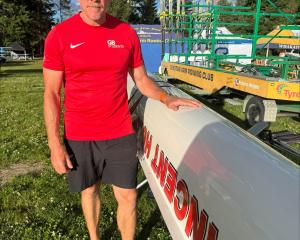
Luckily, the experience of its two longest-serving employees can help avert disaster.
Don Nicolson (63), of Roxburgh, and Quentin McLean (65), of Alexandra, have worked as generation technicians at the dam for 27 and 25 years respectively.
Mr McLean said they were charged with "keeping the turbines turning".
"If there are any jobs, anything to be fixed, we sort it out."
Mr Nicolson said that in the course of their careers, the change in technology had changed the job dramatically.
"We used to have to service basically with an oil can and go out to make sure everything’s working. The new technology has taken away a lot of that. The valves you used to have to operate by hand, now we’ve got a system where you push a button and basically everything will start."
For his first six years working at the dam he lived at the Lake Roxburgh Hydro Village, which was set up to house its workers.
"I can’t remember what the houses cost to rent, but the garages were 50c a week."
It also came with other perks, meant to incentivise workers to live there.
"You had a power allocation, so you could use so many kilowatt hours and after that you’d have to pay for it. Normally you wouldn’t go anywhere near your allocation, so you’d have two-bar heaters all over the house and it wouldn’t worry you. We’d put one under the bed."
In the mid-1990s, the whole village was sold to private buyers, he said.
"No-one that works here lives in the village now."
Working at the plant made him more efficient in his personal power use, he said.
"It makes me aware of having a bad power bill. We’ve installed a lot of gas systems in our house."
Mr McLean admits the job is a high-stakes game, which can bring stress with it.
"We don’t even want to think about what would happen if the dam failed.
"You get called in at 1.30 in the morning, and you’re still a bit wobbly-eyed and you think ‘Now what caused that machine to trip?’. I’ve got to fix that."
The experience of the pair has been crucial at times.
Mr Nicolson recalls one example during flooding that caused widespread damage to Alexandra in 1999.
"Wellington would tell us to make the lake really low to stop the flooding. We’re normally at 131m and they wanted us to go down to 125m. We told them we can’t do that."
Making the lake that low would starve the auxiliary generators of water, he said.
"They would shut down and the whole station would then basically flood, because there would be no pumps running to keep the water out."
Both men work four 10-hour days a week, but will each probably go down to three at some point next year.
After that, neither was sure how long he would stay, Mr Nicolson said.
"There are plenty of experienced guys coming up that they’ve got to replace us. We take them under our wing every now and then."












